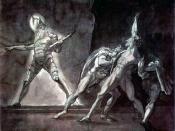Hamlet's Procrastination and Cowardice In William Shakespeare's play Hamlet, Hamlet is a loyal prince who vows to avenge his father's murder. When Hamlet discovers the painful truth about his father's death, he is left with feelings of hatred and resentment in his heart towards the murderer, Claudius. Although Hamlet is a very noble and sophisticated man, he struggles with the issue of avenging his father's death. He swears his revenge will be quick, however, this is not the case. Since Hamlet is more into philosophizing than action, he thinks about his intention to kill Claudius. The more he thinks about his intention, the less he is able to execute it. The tragic flaw that Hamlet possesses is his inability to act. He vows that he is going to kill Claudius but backs out of it several times before the deed is actually done. Hamlet's first sign of procrastination and lack of action begins to show through his character at the very beginning of the play.
The ghost informs him about Claudius' evil doings. Hamlet is prompt by replying: "Haste me to know't; that I, with wings as swift As meditation or the thoughts of love, May sweep to my revenge." (Shakespeare, p. 67) This passage shows how Hamlet decides to avenge his father's death. In fact, he declares that he will be committed to nothing else but the revenge against Claudius: "I'll wipe away all trivial fond records, All saws of books, all forms, all pressures past, That youth and observation copied there; And thy commandment all alone shall live Within the book and volume of my brain, Unmix'd with baser matter: yes, by heaven!" (Shakespeare, p. 69).
At this point, there is no doubt present in Hamlet's mind; he is determined to kill the King. His attitude soon changes...


